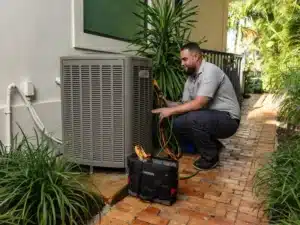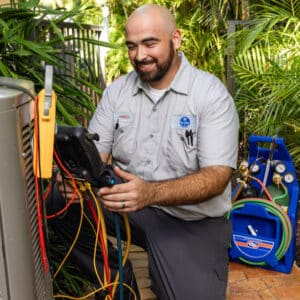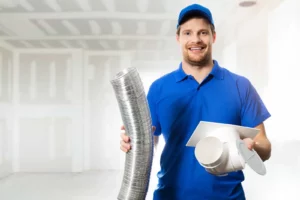What to Expect During a Professional AC Installation
When it comes to keeping your Florida home comfortable, a...
In Florida, where the heat and humidity are constant, commercial HVAC systems are essential for maintaining a comfortable indoor environment. However, running these systems year-round can be costly. To reduce energy expenses and enhance system performance, it’s critical to focus on energy efficiency. There are several strategies to improve HVAC efficiency, from basic maintenance to system upgrades. Implementing these strategies can significantly cut costs while ensuring your business stays comfortable year-round.
The foundation of any efficient HVAC system is regular maintenance. When an HVAC system is neglected, it tends to run less efficiently, leading to increased energy consumption. Filters that are clogged, refrigerants that are low, or components that are dirty can all cause a system to work harder than necessary, which increases energy use. Ensuring that your system is regularly cleaned, maintained, and inspected is one of the most effective ways to improve its efficiency.
Start by scheduling routine service visits for your commercial HVAC system at least twice a year. A professional technician can inspect the system, clean components like coils and ducts, check refrigerant levels, and replace filters. This keeps the system operating at optimal efficiency and reduces the chance of breakdowns, which could lead to expensive repairs or system replacements.
One of the simplest ways to cut down on energy costs is by installing programmable thermostats. These thermostats allow businesses to set temperature schedules based on occupancy, so the HVAC system is not running unnecessarily during off-hours when the building is empty. For example, during the night or on weekends, the system can be set to a higher temperature, reducing energy consumption. When the office or store is in use, the temperature can automatically adjust to a comfortable level.
This type of thermostat can also help reduce the strain on your system. Since the HVAC doesn’t have to run constantly at full capacity, it’s less likely to wear out prematurely. Some modern programmable thermostats also allow remote control, providing flexibility in adjusting settings from a smartphone or computer.
If your commercial HVAC system is outdated, it may be time to consider upgrading to a more energy-efficient model. Newer HVAC units are designed to meet higher energy efficiency standards and often feature advanced technology that can help lower energy costs. Look for systems that have a high SEER (Seasonal Energy Efficiency Ratio) rating or are ENERGY STAR certified. These systems are built to consume less energy while still delivering the same level of performance.
Replacing old equipment can be a significant investment upfront, but the long-term savings on energy bills often outweigh the initial cost. Energy-efficient systems also tend to have fewer maintenance issues, so they may save you money on repairs in the long run.
Leaky ducts are one of the biggest culprits when it comes to inefficient HVAC systems. When air escapes through holes, cracks, or poorly sealed joints, your system has to work harder to reach the desired temperature. This leads to higher energy consumption and wasted resources. Sealing your ducts ensures that the air being pushed through the system is directed exactly where it’s needed. Proper insulation further reduces energy loss by preventing conditioned air from escaping or hot air from entering the system.
Having a professional technician inspect your ductwork and perform sealing or insulation upgrades is an excellent way to increase your HVAC system’s efficiency. In some cases, a ductless system can be installed for greater flexibility and energy savings, especially in smaller or segmented spaces.
Zoning allows you to control the temperature in different areas of your commercial building independently. With a zoned system, you can create separate temperature zones for different rooms or departments, ensuring that no energy is wasted by cooling or heating unoccupied areas. This system is ideal for buildings that have varying levels of foot traffic throughout the day, such as offices or multi-level buildings. Zoning helps ensure that each space remains comfortable without overworking the system.
To implement zoning, you may need to install additional dampers in the ductwork and add extra thermostats in different areas of your building. While the upfront costs can be higher, the long-term energy savings will more than make up for it.
Proper airflow is essential for maintaining HVAC efficiency. If your system’s airflow is restricted, it forces the unit to work harder and consume more energy. This can be caused by dirty filters, blocked vents, or even improperly sized ducts. Ensure that all air registers and vents are clear of obstructions and that the air is flowing freely through the system. This simple step can go a long way in improving your HVAC’s performance.
Additionally, ensure that your HVAC system is properly sized for your space. If the system is too large or too small for your building, it will not run as efficiently. A professional technician can help you assess the right system size based on your building’s needs and the number of occupants.
Florida’s climate is often hot and humid, but there are times when natural ventilation can be an effective way to cool your commercial space. Opening windows, utilizing ceiling fans, or using exhaust fans can help promote air circulation and lower the demand on your HVAC system. While natural ventilation alone may not replace air conditioning in the peak summer months, it can complement your system during cooler periods, reducing the amount of time your HVAC system needs to run.
Your employees play a role in your building’s energy efficiency as well. Encourage staff members to keep doors and windows closed when the air conditioning is on, and avoid using space heaters, which can strain the system. A small change in behavior, such as ensuring blinds are closed to block out the heat of the sun, can reduce the workload of your HVAC system. Keeping your employees informed and engaged in energy-saving practices will help reinforce the importance of sustainability in the workplace.
Energy efficiency doesn’t just benefit your bottom line, it also helps reduce your building’s carbon footprint and contributes to environmental sustainability. By implementing the right maintenance practices and investing in energy-efficient technologies, you can create a more comfortable, cost-effective, and eco-friendly commercial space.
Take proactive steps today to ensure that your HVAC system is running as efficiently as possible. Whether it’s upgrading to a newer model, sealing ducts, or using natural ventilation, every improvement you make can help lower your energy bills and extend the life of your HVAC system. Make sure to consult with an HVAC professional to assess your specific needs and find the most effective solutions for your building.

When it comes to keeping your Florida home comfortable, a...

Maintaining your air conditioner regularly is more than just a...

Florida homeowners rely on air conditioning more than most parts...

Indoor air quality is a major concern for many Florida...

Indoor air quality, often abbreviated as IAQ, plays a crucial...

Installing a new HVAC system is a significant investment in...